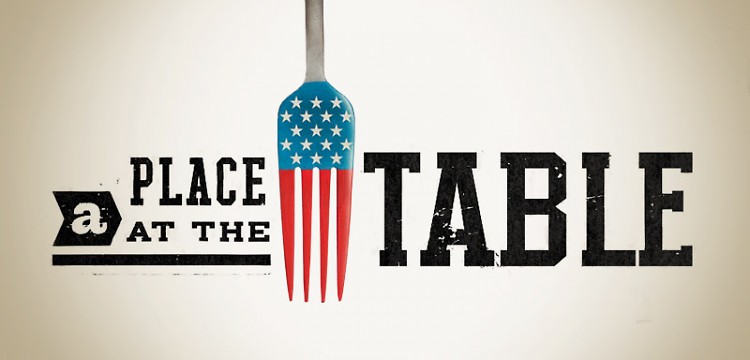Kristi Jacobson and Lori Silverbush’s new documentary “A Place at the Table” opens at the UICA this weekend. The film is an attempt to turn the spotlight on conditions that allow 49 million people in America to live in households that are labelled as “food insufficient.” Commentary from politicians, doctors, economists, activists, teachers and, most strikingly, from a handful of people who go hungry on a regular basis lends a powerful and devastating voice to the film.
Drawing on an extensive supply of staggering statistics “A Place at the Table” has no difficulty defining the scope and escalation hunger in America has seen over the past 30 years.
Since the Reagan administration, the amount of people who go hungry in this country has increased by 30 million. At the time the film was made 50% of children in the U.S. were projected to live in households on food assistance and yet, paradoxically, food assistance is still not available to everyone in need of it.
Throughout the film we see that even those households who receive food assistance are then put in the position of having to pick and choose the most affordable foods that will enable them to feed themselves. More often than not this means they must purchase highly processed foods at the expense of the food that provides the most nutritional benefit. This is particularly detrimental to children.
“It’s appalling,” says actor Jeff Bridges, one of the founders of the End Hunger Network. “If another country was doing this to kids we’d be at war.”
Hunger in this country isn’t black and white- it’s a highly complex issue. It’s also one very few people are willing to talk about publicly.
“It’s a problem that people are ashamed of acknowledging,” Bridges says. “Our own government is ashamed of it. We’re in denial about it, I think.”
The United States is at the bottom of the International Monetary Fund’s list of “Advanced Countries on Food Insecurity” list, right below Korea and Israel.
The film expertly expands and narrows the zone of focus on the hunger discussion. It draws on the personal experiences of residents from Collbran, CO, Philadelphia, PA and Jonestown, MI. It intertwines the voices of those whose opinions are regularly heard by this country’s representatives with those who are consistently neglected by their government. The latter also happen to be those who live on the barest of resources.
It also draws attention to the complex this country has created around being impoverished in the first place.
“Being labelled as low income is shameful in itself,” says Barbie Izquierdo, a single mother from Philadelphia. “I feel like America has a stigma about families eating together at the table. But they don’t talk about what it takes to get you there or what’s on the table.”
“I feel like I lived under this umbrella of feeling inferior to others,” says Leslie Nicholls, a teacher in Collbran grew up in a food insufficient house. “It messes with you.”
The film’s commentators suggest that hunger problem is inextricably linked to poverty and our society and government’s apparent inability or unwillingness to address it in a meaningful and lasting way.
“Is it that people are going hungry because there’s a shortage of food? No, it’s not,” says author Raj Patel. “It’s because of poverty. Then you’re in a different question. It turns out to be ‘why are people poor?’ It’s about power and class and inequality and the persistence of inequality... The government will do the right thing only after every other option has been exhausted... What is it they spend on food stamps? The cost of hunger is way, way higher.”
The amount of information contained in the 84 minutes of this film is astounding. It discusses every facet of the hunger problem from food production to corporate lobbyists to wages and accountability. It focuses on the need for a complete overhaul of the system, and shifts the debate to a national and global scale, while dragging hunger in this country out of the crevices that allow it to go undiscussed.
The film is heartbreaking and shaming and completely necessary. We can’t fix a problem until we make an effort to face it and understand it. “A Place at the Table” turns around and meets it head on.
“A Place at the Table” opens at the UICA on Friday, March 29 and will show through Thursday, April 4.
The Rapidian, a program of the 501(c)3 nonprofit Community Media Center, relies on the community’s support to help cover the cost of training reporters and publishing content.
We need your help.
If each of our readers and content creators who values this community platform help support its creation and maintenance, The Rapidian can continue to educate and facilitate a conversation around issues for years to come.
Please support The Rapidian and make a contribution today.

